Families of Sam Sharpe and Dvontaye Mitchell Hold Rally
Sharpe was killed during RNC, Mitchell died in earlier incident involving hotel security guards.
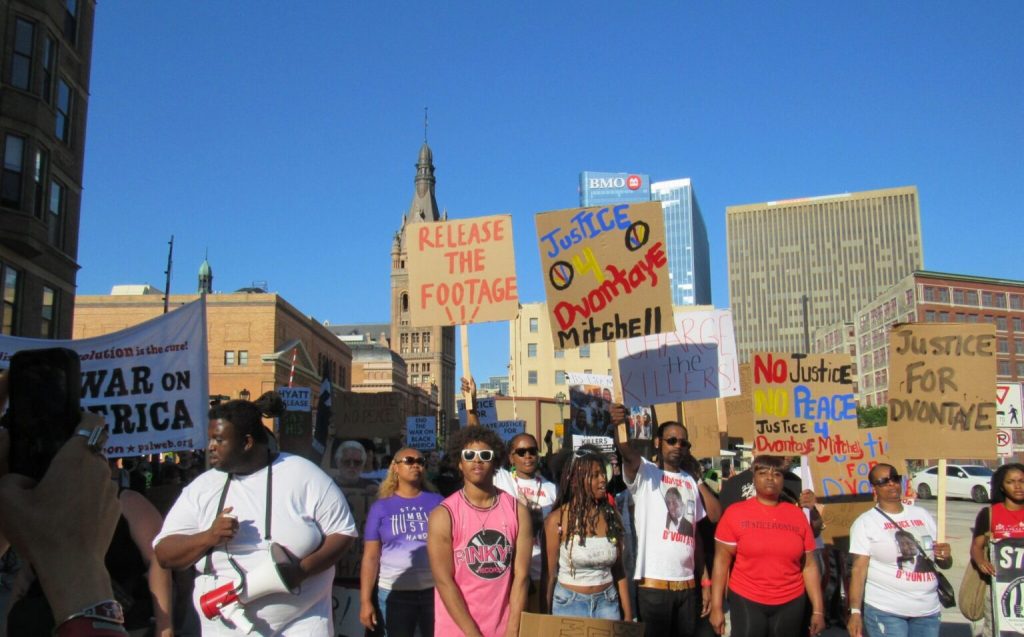
A rally and march held at Red Arrow Park for Dvontaye Mitchell and Sam Shorte. (Photo | Isiah Holmes)
Local activists gathered in Milwaukee’s Red Arrow Park Thursday evening, as they did at the start of the Republican National Convention (RNC), to rally and march. But this time instead of protesting they were mourning. Holding signs and accompanying grieving families, the group chanted the names of D’Vontaye Mitchell and Sam Sharpe. Mitchell died after being held down by security guards at Milwaukee’s Hyatt Hotel on June 30. Sharpe, who lived unhoused in a local park, was fatally shot Tuesday by Columbus, Ohio, police who were deployed to provide security for the RNC.
Family members of both men shared their experiences and questions with a large group of media at Red Arrow Park. As they spoke, dozens of law enforcement officers watched from inside the park, across the street at City Hall, and from helicopters and drones that hovered overhead.
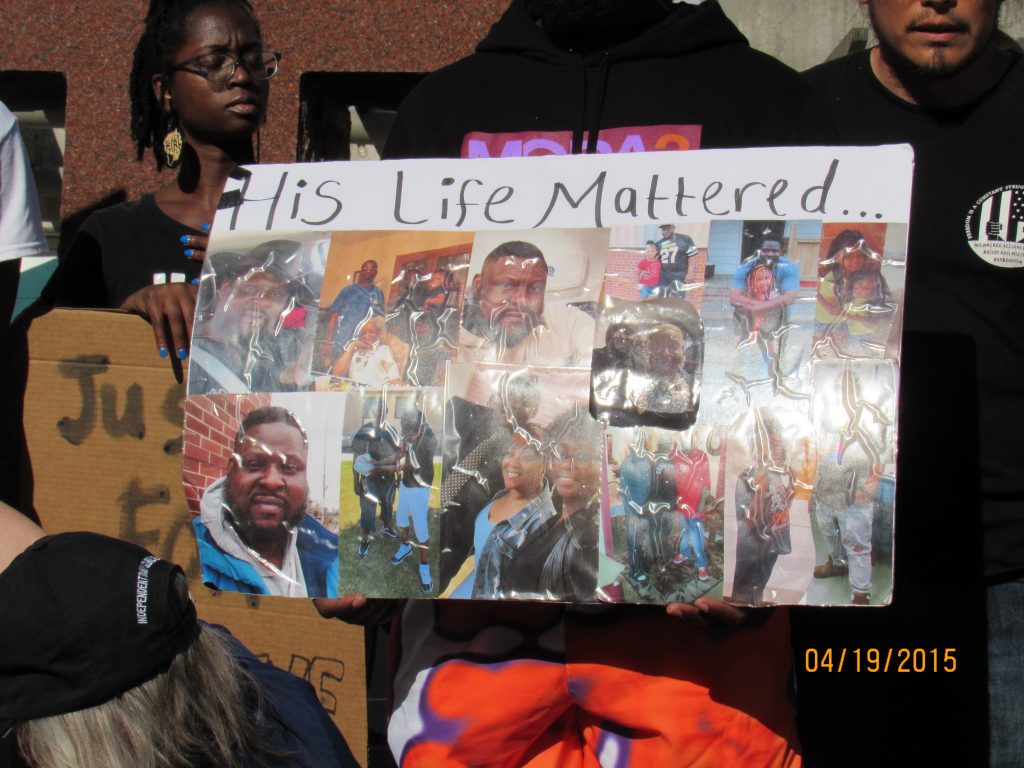
A rally and march held at Red Arrow Park for Dvontaye Mitchell and Sam Shorte. (Photo | Isiah Holmes)
“It’s been two and a half weeks now since Dvontaye’s murder,” said Latrisa Giles, Mitchell’s first cousin, at the rally. “I want everybody to know that initially they tried to sweep this under the rug.” News outlets have reported that video shows security guards at the Hyatt kneeling on Mitchell’s back and neck, with one guard striking Mitchell in the head with an object.
When police arrived, Mitchell was already unresponsive. Giles said that the police had been called because Mitchell was allegedly causing a disturbance. “They beat the hell out of him until he died,” said Giles. “He was begging for his life.”
No arrests have been made in the case, she said. “We’ve been pushing, and we’ve been pushing hard,” said Giles, and began to hear from police only after pressure from the family and media.
Mitchell’s cousin remembers him as a “fun, caring, loving person” who always had a smile on his face and l loved to cook. “D’vontaye could turn scraps into a gourmet meal. You know, he was just an overall cheery person,” Giles told Wisconsin Examiner, noting that he was self-sufficient and always working.
She learned about Mitchell’s death through a text from her aunt just before bed. “I quick ran over to her house because she doesn’t stay that far from me, and it’s just still a shock,” Giles said.
The family said that initially they were told that the case wasn’t being investigated as a criminal matter. After the family began to protest they received word that charges had been referred to the Milwaukee County District Attorney. Since then, the family has been told that they need to wait until after an autopsy.
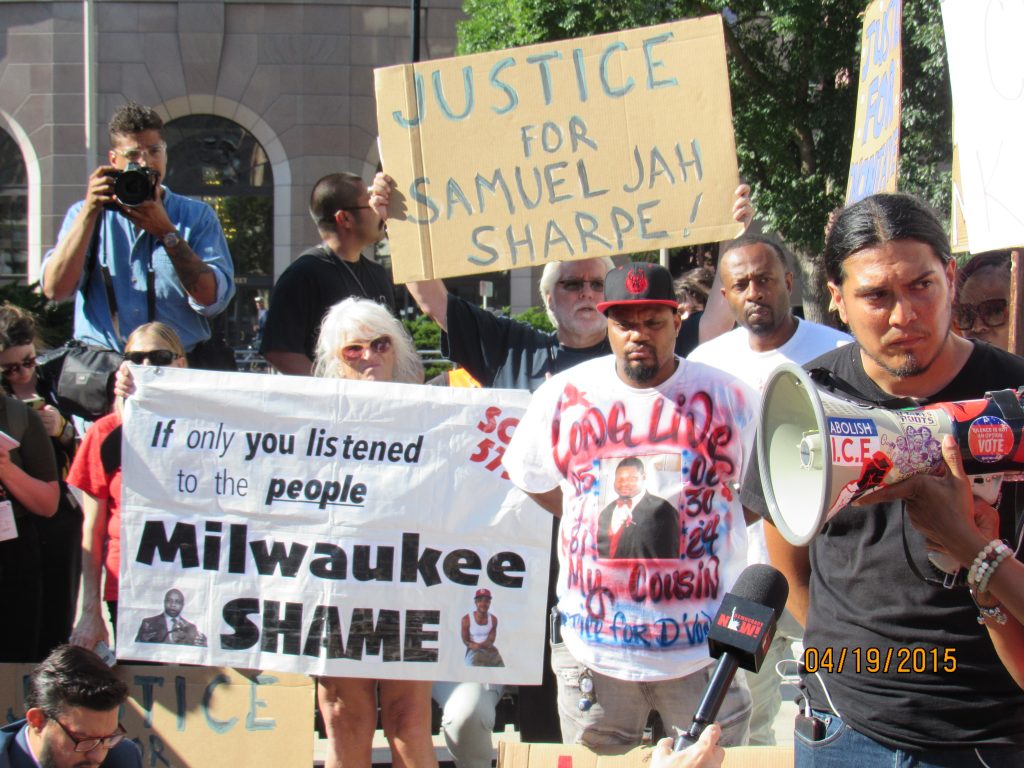
A rally and march held at Red Arrow Park for Dvontaye Mitchell and Sam Shorte. (Photo | Isiah Holmes)
“It’s just…it’s wild and crazy because my cousin was killed by all those employees at the Hyatt and nobody has been arrested,” Giles said.
Several members of Mitchell’s family spoke at the rally, including cousins and siblings.
They were also joined by the family members of Sam Sharpe. Sharpe lived in an encampment of unhoused people in King Park. The officers saw a fight between two men and immediately drew their guns, running toward them while yelling commands. About 14 seconds after the officers first saw the fight, Sharpe was dead.
The Greenfield Police Department is investigating the shooting through the Milwaukee Area Investigative Team, which is responsible for investigating fatal officer-involved shootings. But Sharpe’s family said that as of the rally, they have yet to hear from any investigators.
“Y’all not going to make him out to be a knife wielding criminal because that’s not who he was,” said Angelique Sharpe. “The streets know him, the police do not. Y’all don’t get to tell the story and tell the narrative, we’re gonna tell it. That narrative stops today! Sam was not that guy!”
At the rally, Sharpe’s family said that he lived with multiple sclerosis, mobility issues, and lesions on his brain. Sharpe was vulnerable in the park. He told his family that some men in the park had taken to beating and threatening him, which led Sharpe to acquire a couple knives to defend himself.
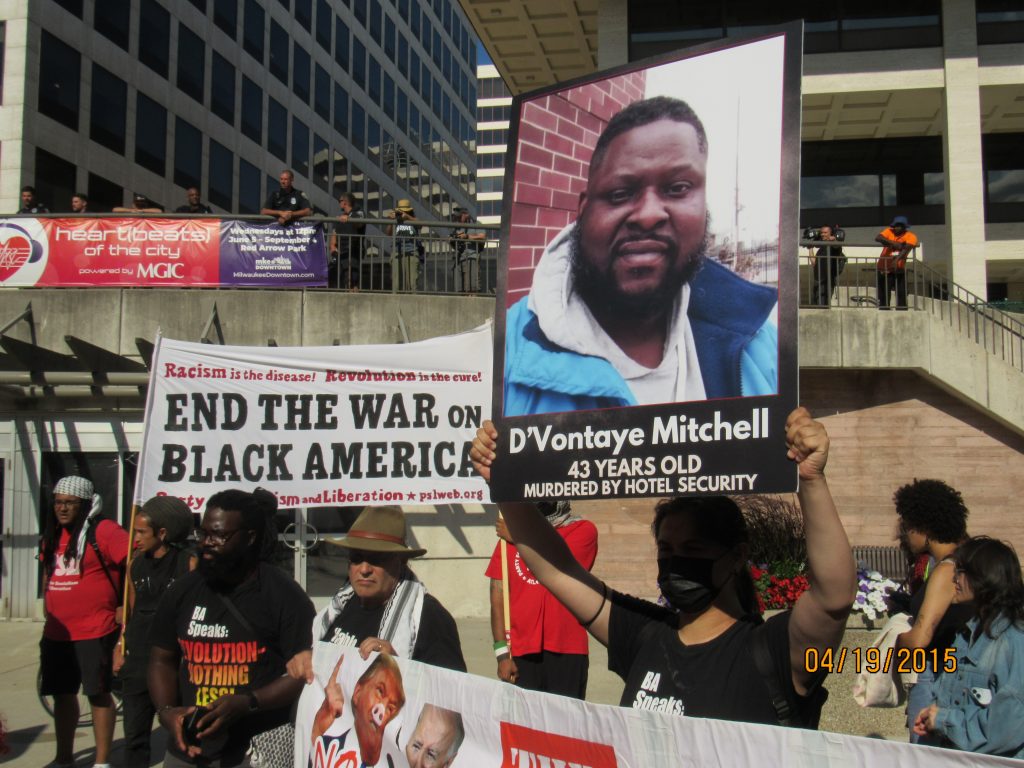
A rally and march held at Red Arrow Park for Dvontaye Mitchell and Sam Shorte. (Photo | Isiah Holmes)
Katrina Games, Sharpe’s aunt, said that he had been invited to come home instead of sleeping in the park. “He said, ‘Well my dog is there,’ and he loved that dog,” said Games. “He loved animals so he went down to get the dog.”
Games said Sharpe tried to tell the police about being threatened and beaten, but nothing was done.
“He went down to get his dog, and the guy that he was fighting started antagonizing him knowing that he really couldn’t walk,” said Games. “So he was so angry because they was trying to mess with his tent, mess with his dog, mess with him. He just got tired of it. He wanted to be on his own with his M.S. He didn’t want us to feel like we had to take care of him and burden him. He told us all that God told him to go and help in that community. And that’s what he did.”
Sharpe struggled when he was younger, but Games said he’d lived for over 13 years with no police confrontations.
His family believes that when police yelled for Sharpe to stop, he couldn’t catch his balance or turn due to his difficulty on foot . “He doesn’t walk well, he can barely go up three flights of stairs,” said Games.
Sharpe’s family say that officers fired 27 rounds at the man. “If he was someone else, if he was a different race — and I hate to bring race into it because I have all races in my family — but you wouldn’t have killed him like that, you wouldn’t have shot him like that,” said Games, who called his death “just horrible.”
On Tuesday, the day of the shooting, Milwaukee Police Chief Jeffrey Norman said that five officers fired their weapons. Sharpe’s family wonders why the officers didn’t use a taser, or some other method to break up the fight.
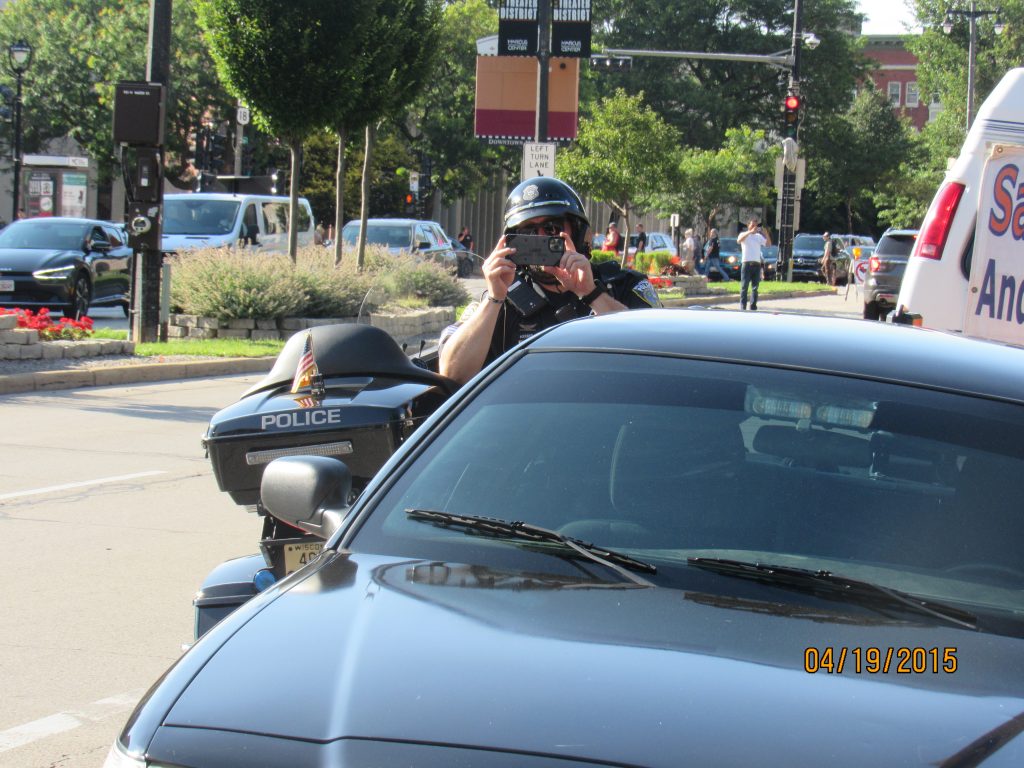
An officer films a protest during the march and rally for Sam Sharpe and Dyvontaye Mitchell. (Photo | Isiah Holmes)
Sharpe was the eighth person shot by Columbus, Ohio, police officers so far this year, the Columbus Dispatch reported. Activists, elected officials, and other city residents have also asked why the officers were more than a mile outside of the RNC’s security zone. “You ran up on him and you shot him, you didn’t even give him a chance to stop,” said Games.
Other members of Sharpe’s family spoke during the rally as well. Afterward, the group turned the rally into a march past City Hall and across the river towards the Hyatt Hotel where Mitchell was killed. As the march neared the hotel, dozens of state troopers, police officers and other law enforcement gathered outside the security perimeter’s black gates or blocked nearby streets. In front of the Hyatt itself, dozens of other officers stood watch as the marchers chanted.
Video of Sharpe’s shooting circulated online the same day it occurred. Among those videos was body camera footage, released by the Columbus Police Department, but edited to freeze at the moment the shots were fired.
Families who have lost loved ones in police shootings or deaths at the jail or at local police districts have fought for more transparent video release policies in Milwaukee. After the police reform movement of 2020, activists from the Milwaukee Alliance Against Racist and Political Repression drew up a proposed policy that would require the release of video of officer-involved shootings within 15 days of the incident and allow the family to view it within 48 hours.
Shortly after the policy was adopted by the city’s Fire and Police Commission, however, a lawsuit filed by the Milwaukee Police Association blocked it from being implemented . Police officials argued that the policy would hamper officer-involved shooting investigations.
Even without the lawsuit, the new policy had also been suspended during the RNC. On Wednesday, the Alliance learned that the police association had dropped its lawsuit, allowing the video release policy to fully take effect.
With the Sharpe shooting, as well as another non-fatal shooting by officers Wednesday night, clearing the way to reinstate the policy comes at a critical time.
Aurelia Ceja, co-chair of Milwaukee Alliance Against Racist and Political Repression, told Wisconsin Examiner that the police association said the lawsuit wasn’t worth it to the union. The Milwaukee Journal Sentinel reported a statement by police union President Andrew Wagner that the lawsuit had become “ fruitless,” to pursue. Wagner said that Chief Norman can enforce whatever policy he wants, and that he supports the video policy.
Ceja believes that the lawsuit “was an act of political repression to hold it up in a court case for a year,” she told Wisconsin Examiner. “It prevented any sort of policy release during that time from taking into effect.”
Noting that the shooting occurred right after the lawsuit blocking the video release policy was dropped, Ceja said that now is the time to put the new policy to the test.
While the Wednesday night shooting is being investigated by Milwaukee’s homicide unit, Sharpe’s shooting is essentially being investigated by a neighboring police department. That practice does not satisfy the Milwaukee Alliance.
“We never trust police departments to investigate themselves internally, but we also don’t trust the police to investigate themselves externally,” said Ceja. “Whether it’s Greenfield, Columbus, Milwaukee, they’re all one in the same, and we know that this is not an unbiased review of what happened. So while we do think it is important to have an outside investigation, it should not be coming from another police department. It shouldn’t be coming from anyone involved in the police department.”
The Alliance advocates for community control of the police, which would include an elected civilian police accountability council. Such a council would handle the discipline, hiring, firing, and budget of the police department.
“It would be community members like myself, like the family members, like so many other people here that have been fighting for less police funding and more oversight, who would be able to put those things into effect,” said Ceja.
Families of Sam Sharpe and Dvontaye Mitchell rally in Red Arrow Park was originally published by Wisconsin Examiner.




















